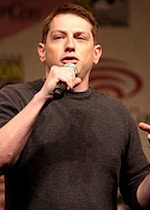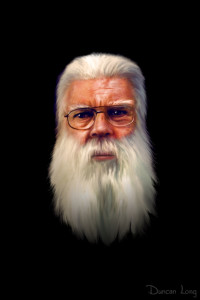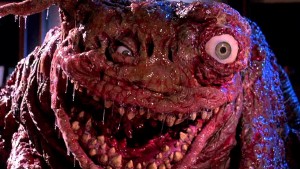Vendetta by Gail Z. Martin
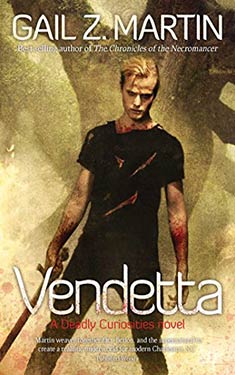 Vendetta is Gail Z. Martin’s follow-up to Deadly Curiosities. Written December of 2015 and published by Solaris, it is the second book in the “Deadly Curiosities” urban fantasy series set in modern day Charleston, South Carolina. This series just keeps getting better. Many of the complaints I had when reading the first novel, which I loved, have been rectified in this second book in this new promising series.
Vendetta is Gail Z. Martin’s follow-up to Deadly Curiosities. Written December of 2015 and published by Solaris, it is the second book in the “Deadly Curiosities” urban fantasy series set in modern day Charleston, South Carolina. This series just keeps getting better. Many of the complaints I had when reading the first novel, which I loved, have been rectified in this second book in this new promising series.
The ghosts in Charleston are getting very riled up, manifesting in more and more violent manners, and it is up to Cassidy Kincaide and gang to figure out why and solve the problem before someone gets hurt. In addition, people are disappearing across the city while walking down stairs. That’s right they just disappear mid-stride.
As in the first book, Vendetta is filled with action. Starting from page one, there are ghostly battles filling every one of its 459 pages. Cassidy is getting more proficient in controlling her powers and this makes for tighter plotting throughout this novel. I did not have to wonder if the reader was going to be treated to yet another “Cassidy collapse” each time she walks into a new room.
Charleston the city is definitely more of a character in this second novel, specifically the “Angel Oak” on Johns Island. I looked this up and it is a real tree. The author is doing a fine job of making me curious to learn more about Charleston. This had been one of my gripes about the last book, I thought Ms. Martin should have written more about the city itself, and I think she vastly improved upon this with this second book.
I was also relieved to see that the characters were making fewer nonsensical moves in this book, or they were still making them but admitted that they were bad ideas. I’m OK with making dumb moves when the characters feel they have no choice, and acknowledge that the move is not the smart one. In this case, because time was becoming an issue and the evil at work in Charleston was so powerful Cassidy and friends needed to pull out all the big guns including Sorren, who had a much larger part in this book than the last.
So my new complaint about this book, and it is a small one, is that the true nature of Cassidy and Sorren’s shop, Trifles and Folly, is supposed to be a secret, but by the time this book ends it is apparent that it is the worst kept secret in the history of secret keeping! Everyone who has ever been introduced in either of the books apparently already knew all about it.
I’m giving Vendetta 4 enthusiastic stars. There is so much potential in this series. I hope the author introduces a multi-book plot in the next one, to keep the series from becoming too formulaic. Maybe more about “The Family” and “The Alliance” the two secret organizations only briefly mentioned in the books so far.
Note: This novel was given to the reviewer by the publisher for a fair and honest review.
New Publications: The Blizzard by Vladimir Sorokin
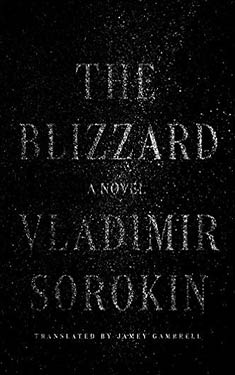 Whenever I review of a foreign language work of speculative fiction, I find myself including a statement reflecting my certainty that readers of the work in its original language – Russian, Spanish, Estonian, whatever – have a fuller experience of its subtleties, humor, and imagery than I. That statement usually comes towards the end of the review, but with Vladimir Sorokin’s The Blizzard, I have decided to put it up front. I feel certain that his Russian readers have a – well, as I said.
Whenever I review of a foreign language work of speculative fiction, I find myself including a statement reflecting my certainty that readers of the work in its original language – Russian, Spanish, Estonian, whatever – have a fuller experience of its subtleties, humor, and imagery than I. That statement usually comes towards the end of the review, but with Vladimir Sorokin’s The Blizzard, I have decided to put it up front. I feel certain that his Russian readers have a – well, as I said.
It helps to learn that Russian readers, by the time they reach adulthood, have received a steady diet of “lost in the snow” narratives. The motif appears in fiction, verse, and folklore, and the stories almost always end poorly for their protagonists. The Blizzard opens with Dr. Garin, who is desperate to find transportation for himself and his serum to the plague-struck village of Delgoye, learning that snow has shut down the railway. It’s a set-up that will prompt Russian readers to think, “Here we go again.”
The forested, rural setting seems nineteenth century, and the frantic Dr. Garin, with his pince-nez and mustache, steps out of a Chekov story. That atmosphere continues when Dr. Garin learns that Crouper, the peasant who handles local bread deliveries, may have horses and a sleigh available. He approaches the man, who does indeed have horses. He has fifty of them. This is a reasonable number, since they are the size of partridges, and they propel his sleigh by running inside a drum. The doctor convinces Crouper to undertake the journey, which in normal circumstances would take only a few hours. The village will be saved from what we learn about this time is an outbreak of zombies caused by a virus brought back from Colombia. The dead are tunneling through the village, breaking into homes, and infecting the living. Dr. Garin does not approve of foreign travel.
Sorokin is one of the most popular contemporary novelists in Russia. His work employs fantastic elements in narratives that range from traditional science fiction to the sort of weird environment he builds in The Blizzard. It is never clear if he has set this tale in an alternate nineteenth century or some future that has devolved into a combination of new technology crippled by a collapsed infrastructure. (Thanks to another review, I learned that there are internal clues that place the story in our own present day.) One development running throughout the story is the twin phenomena of biological miniaturization and gigantism. Crouper’s tiny horses are distantly related to horses the size of small apartment blocks. These are used to haul trains that no longer have a power source. On their journey, Garin and Crouper take refuge in the home of a miller the size of a samovar. Garin has a sexual encounter with his full-sized and delectable wife. One of the men’s many road accidents occurs when a runner of their sleigh crashes into and breaks off in the nostril of a dead giant.
The details of all this are enjoyable and expertly drawn, even if their import remains vague. Dr. Garin becomes increasingly unsympathetic, his humanitarian zeal a cover for his temper, condescension, and poor impulse control. My sympathies all went to Crouper and his tender concern for his hard-working horses. You don’t have to be Russian to guess that this trip into the snow will end badly. But again I find myself wondering if a Russian reader finds all this more than a mildly entertaining curiosity.
Deadly Curiosities by Gail Z. Martin
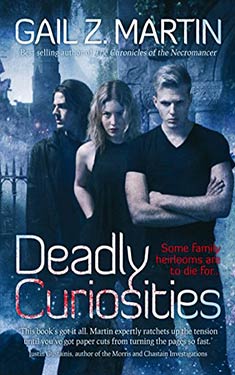 Deadly Curiosities by Gail Z. Martin is the first novel in the series by the same name. This is a modern day urban fantasy set in Charleston, North Carolina. Trifles & Folly is an antique shop that has been in Cassidy Kincaide’s family for generations. This shop is a front to cover Cassidy and her business partner, Sorren’s other occupation, finding cursed and haunted object and destroying or neutralizing them. For all you fans of cult TV series, if this premise sounds familiar, well you are probably thinking of the 1987 to 1990 series, Friday the 13th: The Series. But don’t get too worried, there are plenty of differences. Oh, did I mention that Cassidy can psychically “feel” an object’s history and Sorren is a vampire?
Deadly Curiosities by Gail Z. Martin is the first novel in the series by the same name. This is a modern day urban fantasy set in Charleston, North Carolina. Trifles & Folly is an antique shop that has been in Cassidy Kincaide’s family for generations. This shop is a front to cover Cassidy and her business partner, Sorren’s other occupation, finding cursed and haunted object and destroying or neutralizing them. For all you fans of cult TV series, if this premise sounds familiar, well you are probably thinking of the 1987 to 1990 series, Friday the 13th: The Series. But don’t get too worried, there are plenty of differences. Oh, did I mention that Cassidy can psychically “feel” an object’s history and Sorren is a vampire?
Although I am not a fan of fantasy novels in general, I do enjoy urban fantasies if they can catch my attention — and this one did, right away. For one thing Charleston is a wonderful and unique setting for the novels. One would expect a novel with haunted houses and vampires to be set in New Orleans, or in a more urban setting like New York or Chicago. I do wish the city had been more of a focal point. I think that Ms. Martin missed an opportunity, by not making the city more of a character.
As far as this story goes, the back of the novel is a bit misleading. Although it sounds like the novel is going to be about Cassidy and Sorren solving mysteries and fighting evil, the truth is Sorren is hardly in the novel at all. Most of the time Cassidy is “fighting the evil” with her assistant and friend Teag, and at times his boyfriend Andrew.
I would like to talk about what there is not in Deadly Curiosities. There is no sex in this book, not even passionate kissing, or possessed make out sessions. And for this I am eternally happy. There are also no erotic blood sucking scenes, at one point Teag allows Sorren to take a sip from him, but it is quite possibly the least erotic vampire scene in the history of the written word. There is also almost no blood in this novel which, given the fact that a demon is stalking the streets of Charleston flaying and dismembering homeless men, is a pretty impressive feat. As a side note, this is quite a difference from the last book I read: The Women by Jack Ketchum. This novel is more like anti-splatterpunk.
There were some things that annoyed me about this story and some of the characters’ actions make absolutely no sense. Cassidy is able to see and experience psychically what the people who have owned objects experienced. She has had this skill her entire life, but she seems to have little or no control over her skill, talent, I don’t know what you want to call it. Now Teag and Cassidy have been having a really tough time with objects going all darkly evil and attacking them, so why oh why after they were attacked at the B&B and then again at the shop, and then again at the historical society, why in all that was holy and good would they proceed to go to a museum. Now this is a museum that was already established as a place where Cassidy has had trouble in the past, even before the big evil starts its terror campaign in Charleston. It made no sense!
For all the things this novel lacks, what it does not lack is a sense of entertainment. Deadly Curiosities is probably not going to win any awards, but it was a good distraction from some of the “heavy” sci-fi I have in my plate. I am going to recommend this novel as a perfect “beach read.” At 456 pages, it is a little longer than the normal summer read, but it reads fast and would be well worth it. (This novel was given to the reviewer by the publisher for a fair and honest review.)
4 of 5 stars
Unholy Night by Seth Grahame-Smith
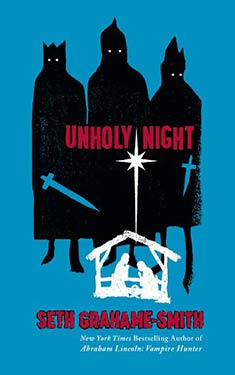 Pretty much anyone who has not been hiding under a rock knows at least the basic story of the birth of Jesus. But for those who have been rock hiding here it is:
Pretty much anyone who has not been hiding under a rock knows at least the basic story of the birth of Jesus. But for those who have been rock hiding here it is:
Mary was a teenage girl engaged to Joseph, a carpenter. An angel came to Mary and told her that even though she was a virgin and a good Jewish girl, the angel was going to impregnate her with the spirit of God, you know, literally.
Well Joseph still married her even though she was “damaged goods” because Joseph also had a little visit from God. When Mary was “great with child” Rome, which Judea was under the rule of, called for a census to be taken. All males and their families were required to travel to the city of their birth and register. Joseph packed up his VERY pregnant wife (AMA I’m guessing) and traveled from Nazareth to his home town of Bethlehem. When he got there, every inn and tavern was full because of the census. An innkeeper felt sorry for the young couple and allowed them to stay in his barn. And Mary gave birth to Jesus there. Three wise men “from the east” are drawn to the stable by the “Christmas star.” They recognize Jesus as their King and give him gifts of gold, frankincense, and myrrh.
This is the story most people are spoon fed every Christmas. Only people who actually study the bible or have a truly brutal religious leader know that this is only half the story.
After Jesus was born Herod, the King of Judea, learns from his mages that the “Real King” has been born and his leadership is in jeopardy. To protect his rule, he ordered all male children born in and around Bethlehem 2 years and younger killed. This is called the “Slaughter of the Innocent.” Joseph is warned by an angel to get Jesus into Egypt and keep him there until Herod is no longer in power.
The entire story of Jesus’ birth and escape into Egypt is less than one page in the bible. But in Unholy Night, Seth Grahame-Smith manages to expand the story into 300 pages. I picked up this audiobook as some light Christmas reading. I mean we are talking about the author of Pride and Prejudice and Zombies, Abraham Lincoln: Vampire Hunter, and How to Survive a Horror Movie. I figured I was in for a little tongue in cheek humor at Christianity’s expense. Although I am a Christian, I’m ok with poking a bit at the faith.
Imagine my utter shock when I realized Mr. Smith wrote this book straight. This is the story of the birth of Jesus from the point of view of the Three Wise Men, specifically Balthazar. Almost nothing is known about these three men, except for what I have listed above. This allowed Mr. Smith to weave a gripping tale about these men, who were actually three criminals who met in a Roman jail and were together by chance.
I have to say, that I loved this book, after I got over the shocks contained in it. This story is violent. I mean “Passion of the Christ,” “Reservoir Dogs” violent. If this story is ever made into a movie, I hope Quentin Tarantino directs it. But the thing is, the bible is full of violence and because Seth Grahame-Smith wrote a story that does not try to change what is to many Christians one of the most sacred stories in the bible, it works for me.
This is not a Christmas story per say, Balthazar and the other wise men do not become true Christians at the end of the book, although Balthazar is fundamentally and forever changed by his contact with the Christ Child. He does find a sense of peace and grows as a person by the end of the novel, and in this it is a glorious story of redemption in the grand tradition of Dickens’ immortal A Christmas Carol. All and all, I have to say that I was blown away by this book. I did not expect something so moving from this author.
For all the Christian readers, have a “Tender Tennessee Christmas” and to everyone have a happy and glorious New Year filled with great food, great friends and great books!!
1897: Aliens! Vampires! Zombies! by Sean Michael Welch
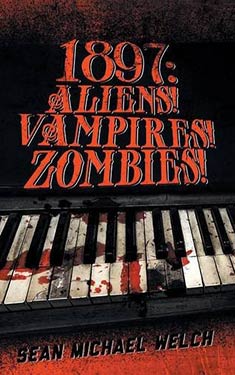 Is there anything better in this world than good zombie novel. With the dramatization of Max Brook’s amazing novel World War Z, and AMC’s mega hit “The Walking Dead,” itself a dramatization of Robert Kirkman’s amazing graphic novels, zombies have become “hip” again. Many authors have jumped on the band wagon with greater or lesser success. 1897: Aliens! Vampires! Zombies! is author Sean Michael Welch’s contribution to the genre.
Is there anything better in this world than good zombie novel. With the dramatization of Max Brook’s amazing novel World War Z, and AMC’s mega hit “The Walking Dead,” itself a dramatization of Robert Kirkman’s amazing graphic novels, zombies have become “hip” again. Many authors have jumped on the band wagon with greater or lesser success. 1897: Aliens! Vampires! Zombies! is author Sean Michael Welch’s contribution to the genre.
The year is 1897 and aliens while observing the Earth, accidentally unleash a zombie plague on the northern hemisphere. Now these are not completely “inhumane” aliens, when they realize their mistake, they do their best to correct their error, this involves the help of revived figures from history and several 1897 contemporaries.
Zombie novels come in three general types. The first, are the true horror stories, these are the run, scream, bleed, run novels examples include “The Dead World” series by Joe McKinney, and of course World War Z by Max Brooks. When they are well written, zombie books of this type are a true horror story. They win awards and are touted as proof that the genre is more than mindless junk for the masses.
The second type is the zombie as the misunderstood monster. This is a relatively new route for this genre. Examples of this are Warm Bodies by Isaac Marion and The Girl with All the Gifts by Mike Carey. Zombies in these novels are blessed (or cursed) with human emotions and motivations.
Mr. Welch’s novel falls firmly in the third category, zombie comedy. Pride and Prejudice and Zombies by Seth Grahame-Smith is a prime example of this type of novel. These novels should be read with tongue firmly placed in cheek, and when well written are probably the most entertaining of the books in the zombie genre.
No one wants to feel like they are being made fun of, especially readers of a genre, such as the zombie genre, who do not get much respect even among other genre readers. Authors who write zombie comedy have to thread a very slim needle, making sure the reader feels they are in on the joke and not part of it. Go too far one way or the other and an author risks alienating their reader. 1897 threads that needle with flair and finesse.
When I first started reading this novel, my mind instantly went to Terry Pratchett and Douglas Adams. This novel contains that kind of humor, smart and funny with just a hint of snark that all really good humor contains. Add in late 19th century manors of speech and dress and you have the making of a funny novel. But like Pratchett and Adams, the humor is dispersed with telling and serious moments.
After finishing this novel I felt my ribs were sore from laughing, but I was also a bit sad. I truly love zombie fiction in all its many forms. Zombie fiction can be a platform to express social issues in a way that can be easily accepted by the masses. I want good zombie fiction, although I have read and enjoyed my share of zombie books of questionable skill. When comedic zombie novels, even good ones like 1897, are released I worry about the genre being taken “seriously.” Let me be completely frank about that last statement. I know the difference between what is fiction and what is true. Climate change is a real concern; zombies are a fun diversion. I just want there to be well written diversions.
As for the story itself, Mr. Welch fills the novel with every science fiction, and fantasy character under the sun. Besides the aliens, vampires, zombies in the title, there are elves, robots, flying horses. About half way through the novel I asked myself well “where are the werewolves,” and the next page had them (sort of). In the hands of a less talented writer, this could have been an overly busy novel, but Mr. Welch was able to give the reader that wink and nod needed. The story ends in a cliff hanger, and this reader for one is looking forward to reading the next installment of the rousing comedic novel. (This book was given to this reviewer by the publisher, Permuted Press, for an honest review.)
3.5 of 5 stars
Solar Express – Three Views
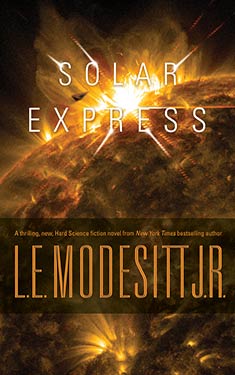 A Futurist, a UFO researcher and a SF guy all walk into a bar carrying read copies of Solar Express. They sit down and get their drinks.
A Futurist, a UFO researcher and a SF guy all walk into a bar carrying read copies of Solar Express. They sit down and get their drinks.
SF: Well, what do you think?
They look at each other. No one says a thing for a few moments.
SF: That bad?
F: Well… I’m trying to think of something nice to say.
UFO: Don’t bother.
F: The man knows hard science but he knows jack about Futures.
SF: Is he supposed to? Would it help the story?
F: It would be nice if a major SF author knew a little bit of Future Studies. Just the basics, mind. I don’t think that’s to much to ask. But this, hell, this is the worse kind of SF. The stuff I can’t stand.
UFO: Here, here.
F: He simply runs a few of today’s trends out, establishes his baseline and then that’s it. A few trends do not a future make. What about all the other trends and how they interact with the trends he’s using? Nothing. Besides, it’s never the baseline.
SF: Is that a Futures’ secret?
F: No it isn’t. It’s what they teach first day. When you run today’s trends out, you get the baseline, but the answer you’re looking for is never the baseline. I’d be shocked if it was.
SF: So you don’t like his world construction.
UFO: Pathetic.
F: Exactly. There’s no change. His politicians are jackasses, the politics are so brazenly normal it’s shocking. Post-docs as wage slaves, on the back side of the moon. (Disgust noise.) At least the background glimpses of the society we got in Clarke’s Rama were different.
SF: That’s hardly being fair.
UFO: That’s life.
F: Let’s just say you were reading something from a hundred years ago or so, something Victorian. And they made a big deal about a woman not being a virgin….
SF: Isn’t that a plot point in Tess… something…
UFO: D’Urbervilles. Yeah, it was.
F: Fast forward a hundred years or so to us, and that doesn’t mean a thing. Victorian lit’ is quaint. Human, certainly, but quaint, and concerned with things we don’t care about. And we’re supposed to believe that there’s been no changes like that in the hundred years out to the time of the novel? I think it makes for very uneven reading.
SF: But that really wasn’t the point.
F: Point or not, the fact it’s not there, not even really considered, is important. The society in which this novel is set, is an important point, but he is either not interested in talking about it or does not have the talent to talk about it. What we get is a blasé “they’re just like us” and he moves on to com’ chatter between a shuttle and station control.
SF: That did get a little repetitive, didn’t it? That and the intricacies of station repair. Life and science in space can be quit tedious. So… what else?
UFO: From my perspective, the whole thing was based on a faulty premise. They’re here. The best minds in the field think they’ve always been here. And it’s only Human arrogance, stupidity and lies that we believe otherwise.
F: Now who’s being harsh?
UFO: He’s in a cul-de-sac. Especially a technological one. The way he talks about space travel is quaint.
SF: Quaint?
F: His expression of space travel is a projection forward from the Now, but if the Now is based on a lie or faulty data, then the projection forward is useless. It can’t be a useful baseline if it’s based on faulty data. It’s gibberish.
SF: What’s the lie you mentioned?
UFO: We’ve known since the 50’s that you can go into a lab and break all three of the so-called Newtonian laws. Period. This mean they’re not laws of any sort just approximations of reality under certain conditions. Change those conditions enough and these so called laws stop working.
SF: Ouch.
UFO: Since the government has know that for close to 70 years, space travel as we know it from NASA is a dog ‘n pony show for the rubes. The lie is, that’s the way it has to be.
SF: And we’re the rubes.
UFO: Exactly. The lie covers the existence of what can be called the technology of the gods. We barely survived the nuclear era with that level of technology. Do you really think we could survive “the death star has cleared the planet” levels of technology?
F: The lie is a good thing then?
UFO: Hell no.
SF: So, we’ve got faulty premises and a background society that’s just like us…
F: And M.A.D. too.
SF: Mutual Assured Destruction. Tediousness at times. What else? I’ll add that there were passages that I got bogged down in with all the science and techno babble.
UFO: I thought the arc of the story itself was really obvious. I kept waiting for something to pop up that wasn’t what I expected. I wasn’t expecting monsters or any dribble like that but… you know… observation, mission, solve some problems, get back safely, win the girl and a medal. No surprises.
F: I thought the relationship between those two was… quaint. Almost like something out of the 19th century. They wrote long letters of encouragement to each other. How nice and romantic. That just strikes me as unrealistic. We’re a hundred years out. Moore’s law for computation power seems to have stalled or slowed precipitously. Hell, IBM’s Watson is practically on the level of the COFAR M.I. today. And everyone seemed to have skimped on bandwidth for reasons which seemed either lame or nonexistent.
SF: We’re back to world construction from the trends.
UFO: And those Hotnews! summaries. They reminded me of Ruby Rhod from The Fifth Element.
F: Yeah. Him. If that’s where Humanity gets it’s news, no wonder that society was M.A.D.
SF: That’s scarcely a criticism since the same can be said of our own.
F: I actually thought that stuff was quite tame. Compared to what one might get if you ran today’s crap that passes for news forward by a century.
SF: I liked the quotes.
F: But they’re so applicable to our own society as well.
UFO: That can’t be much of a criticism since one can read the political musing of Cicero and they’re equally valid.
SF: Do we know if he made those quotes up, like Herbert did all the time, or did he get them from somewhere? I assumed he did the Herbert thing. It’s a writing technique I’ve always liked.
F: No idea.
UFO: I assumed it was the author speaking to us through the quotes.
The conversation stalls for a moment as another round of drinks is brought over.
SF: I think we’re being a bit harsh. Isn’t there anything to like in this book?
F: That, I think, is the real problem. It’s solid work, if you just read it and that’s it.
SF: In the moment, it’s fine. But once you start picking at what he’s doing and why, it comes apart.
UFO: You’d have to discount fundamental scientific advancement being in a cul-de-sac since Einstein.
F: And discount the inconsistent use of the trends in your world building…
SF: Nothing memorable about the characters either…
UFO and F glance at each other, knowingly.
F: You’re not going to bring Gally into this are you?
SF: I was not. That’s really not fair. But a fairer comparison would be there’s no Paul Maud’Dib, no Sylia Stingray, no Hal 9000, no Major Motoko Kusanagi, no Deckard. There’s no one here I’m going to remember beyond next Tuesday. No one unforgettable.
F: What’s the name of the captain who leads the team onto the ship in Clarke’s original Rama book? Don’t…
F points at UFO who was about to answer.
SF: I don’t remember.
F: What’s the plot for that book?
SF: Space ship comes cruising in to use the Sun for a gravitational turn. An Earth ship can intercept, so it does, dead silence and alien stuff. Happy endings for first contact; no fatalities. Ship leaves them in the stellar dust.
UFO: The humans in that story seemed saner? more intelligent? less fracked up? than this story.
F: Less petty. But the point was, you don’t remember the fine details of Rama, so you won’t remember the fine details of this either. But a one sentence summery in 20 years? Probably. Like I said, it’s solid work, if you don’t think about it.
UFO: Safe too.
F: Very safe. It’s works on the assumption that we’re just going to teeter along, creating and solving our problems, just getting by, muddling through like we’ve always done. That is a highly dubious assumption.
UFO: And there’s that bullheaded drum beat about how far away other civilizations are, and not going faster than light speed, and why would aliens bother with this backwater. Hideously stupid.
F: Those three things are all assumptions.
SF: And if all three are wrong…can one write great SF?
F: I don’t think so. You can write solid and safe but not great.
SF: Because greatness usually breaks molds, upsets apple carts, and goes places never gone before.
UFO: Can’t accuse this book of that. (Laughs.)
They grow quiet for a moment, finishing the current round of drinks.
SF: We’ve not even skirted around the big lie which sets the book in motion.
UFO: You cannot militarize space. Bull.
SF: The minute I read that statement, which was right after the back cover of the book, I thought we were already in trouble. Another quaint idea.
F: Another assumption about how the world works which, unfortunately, isn’t true.
SF: We’re all adults here. We know N.A.S.A. was incorporated under the D.O.D. which mean anything they do…
UFO: Or find…
SF: …can be classified under national security concerns. That’s how it always starts.
UFO: The Snowdons of the world aside…
F: The exceptions which prove the rule…
UFO: …you can keep secrets. And there are many many secrets in this country.
SF: It seems to me you can militarize space all you want, you just can’t tell anyone, publicly acknowledge that you’re doing it.
UFO: Plausible deniability. Exactly. You need secrets being kept, black projects up and running, with compartmentalization of those projects.
F: Oh my, none of that around here.
UFO: And boatloads of money.
SF: How many times has a D.O.D. head made the trek up the hill in the last 30 years and said…(In a passable Goofy voice) Garsh, hyuk, we seem to have misplaced several trillion dollars. Hyuk.
UFO: More than once.
F: If we have secret space stations…
UFO: Or bases on the moon…
F: Who’s going to know it in the civilian population…? And spill the beans…? And be believed…?
SF: Still, it’s a nice idea.
UFO: I’m too old for nice ideas. Democracy is a nice idea too.
SF: Let’s definitely not go there. That certainly wasn’t part of the novel. I’m really bothered by a feeling that for all our harping, I think you’re right. It’s a solid novel.
F: Except for…
SF: Except for everything which we don’t like about it. I finished. Does that count?
UFO: Do you want a reward? Milk and cookies, perhaps?
F: I see no contradiction in the idea that a solid work can also be complete B.S. Yes, it is forgettable, isn’t it?
SF: Only a handful of books published each year, or maybe each decade, have any staying power at all as the generations pass.
UFO: This isn’t one of them.
SF: So, are we agreed? Solid, Safe and Forgettable.
After a pause, they all nod. They get up to leave.
SF: I’m off to sell my copy.
F: I’m just going to donate mine to the YWCA’s used book sale.
UFO: I have a plant stand that needs a support under one leg….
SF: I thought you’d give it to one of your friends upstairs.
UFO: That’s were I got mine originally. Some of them read a lot.
They all laugh before dispersing into the night…
China Miéville’s Three Moments of an Explosion: How Weird Is It?
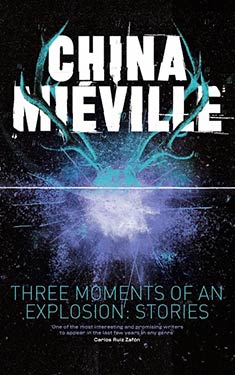 China Miéville is both a proponent and practitioner of New Weird writing. Some of you are probably ready to quit reading at this point. “New Weird” is a term that can seem both vague and unnecessary. Weird writing has its canon revolving around H.P Lovecraft and company with their themes of ancient evil and cosmic terror. Defining a new variety of weirdness can come down to a long list of writers who to greater or lesser degrees produce it – whatever exactly it is. Is it just a more explicit, visceral version of what came before, or is it marked chiefly by its effort to incorporate literary ambitions that divorce it from its pulp origins?
China Miéville is both a proponent and practitioner of New Weird writing. Some of you are probably ready to quit reading at this point. “New Weird” is a term that can seem both vague and unnecessary. Weird writing has its canon revolving around H.P Lovecraft and company with their themes of ancient evil and cosmic terror. Defining a new variety of weirdness can come down to a long list of writers who to greater or lesser degrees produce it – whatever exactly it is. Is it just a more explicit, visceral version of what came before, or is it marked chiefly by its effort to incorporate literary ambitions that divorce it from its pulp origins?
Whatever the case, it is staking out its territory in the speculative fiction arena. Anne and Jeff VanderMeer, who in 2011 established a weird canon with the 1100 page anthology, The Weird, A Compendium of Strange and Dark Stories, had already in 2008 anthologized 30 stories and essays as The New Weird. This year, weirdness enters the crowded arena of annuals with Laird Barron editing The Year’s Best Weird Fiction, Volume I. (If they have come out in the past year, I assume they are “New” Weird by default.)
Miéville contributed both a story to the VanderMeers’ 2011 anthology and an “Afterweird: The Efficacy of a Worm-eaten Dictionary.” He addresses the origins of The Weird without making a specific case for the new variety, but his arguments give a good picture of how his personal vision has been formed. He starts by leading us down an etymological dead end, deriving “weird” from the Anglo-Saxon “wyrd,” a word conjuring a vision of fate and doom as a “cat’s cradle, intricate and splendid as a Sutton Hoo buckle.” He proposes that the weird could be the feral child of the wyrd, but then, in Miévillian fashion, pulls the rug from his own argument. “What if etymology is fucking useless?” Late 19th and early 20th century writers did not engage their Gothic fathers in an Oedipal struggle to develop a new language. Theirs was not a new literature of fatefulness but its rebuke.
The fact of the weird is the fact that the worldweave is ripped and unfinished. Moth-eaten, ill-made. And through the little tears, from behind the ragged edges, things are looking at us.
(You may either read that last bit as a simple declarative statement, or creep it out with internal italicization: things are looking at us.)
His verdict on the VanderMeer anthology: “This is a worm farm. These stories are worms.”
The stories in Three Moments of an Explosion can get pretty wormy. The book is not announced as an exercise in New Weirdness, but the publisher drops a hint on the back cover. We are told to expect “a cast of damaged yet hopeful seekers who come face-to-face with the deep weirdness of the world – and at times the deeper weirdness in themselves.”
Miéville titles this 400-page collection after the three paragraphs of science fiction that opens it. In an unspecified future, a crowd gathers to watch the destruction of a derelict warehouse. At the moment of the explosion, three intrepid thrill seekers ingest tachyon laced MDMA and rush into the collapsing building. They experience it in a moment outside of time. The drug begins to wear off, and only two make it out alive. But two out of three’s not bad, and the thrill was worth it.
Perhaps Miéville is letting us know that he will be slipping us the tachyon/ecstasy pill for each of the upcoming tales, leaving us wide-eyed observers suspended in his visions of collapse and morbid wonders.
To lure us in he opens with “Polynia”, a crowd pleaser about giant icebergs appearing in the sky over London. It’s an offbeat coming-of-age story that progresses from boyish adventure to adult lives lived in an irrevocably changed world.
After “Polynia,” things turn darker and tend to stay there. “Rope” is another sf story, but the mood is dour. Earth has long ago perfected the technology for space elevators, but we have not been able to keep them in good operating condition. A telling moment comes when intergalactic visitors have to feign interest in our pitifully out-of-date wonders. When he leaves sf behind, Miéville cranks up the weirdness dial in stories set in dismal worlds peopled by anxiety-ridden characters performing tasks that have lost their meaning and pursuing lives that offer no safeguards against the chaos engulfing them.
“The Buzzard’s Egg” takes place in a time of religious wars where the battles involve capturing the enemy’s god. In a remote tower, an old man tends to an old god with whom he’s grown quite fond. But the tides of war are changing. Miéville’s writing here takes on the tone of a Samuel Beckett monologue. In “Estate,” a young man, now living alone in his family’s house, is kept awake nights first by birds, then foxes, then rowdy kids. An acquaintance he hasn’t seen since his schooldays returns, and soon the old neighborhood is going up in flames. In “Keep,” the world succumbs to a disease that causes circular fissures to surround the infected. These fissures eventually swallow up entire cities, leaving the sufferer on a small island of solid ground, hence the title “Keep.” (You would probably have to read that one to have any idea what I am trying to describe.)
If you have read much Miéville, you know that it is wise to keep the dictionary app open while you proceed. “The Dusty Hat” has a dense, baroque verbal style perhaps meant to serve no other purpose than to put the reader as out of his depth as is the story’s left-leaning protagonist who slides into a phantasmagoric world of politics made corporeal. (Again, just read it.)
Since I was reviewing this book, I read it through from start to finish. Normally if I were to take up a book like this I would pick may through it, skipping around and possibly never reading every story. So for full disclosure purposes, looking back over the table of contents, I see titles that no longer mean anything to me, and I question the accuracy of my memories of other stories. What I remember most clearly is Miéville’s ability to find a new voice specific to each story. His American movie critic narrator of “Junket” is fully realized and far removed from the medical student in 1930’s Glasgow who tells the tale in “The Design.” It’s true that you are often left marveling at the author’s virtuosity rather than caring about the characters, but I don’t see that as the negative quality some readers report.
I also don’t agree that Miéville’s stories are poorly plotted and tend to wind down rather than end. They don’t wind down. The bottom falls out, taking you with it. And as Miéville said in his attempt to define the essence of Weird fiction, while in free fall you dread that you are about to learn exactly what those things are that are looking back through the holes at us.
Stories for Chip: Fellow Writers Salute Samuel R. Delany
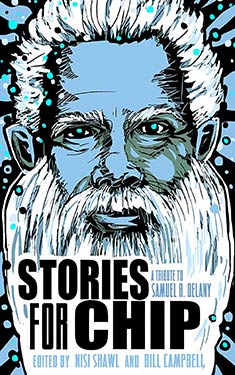 Stories for Chip is a collection of fiction and essays in honor of Samuel R. Delany. Two ways of approaching this review suggest themselves.
Stories for Chip is a collection of fiction and essays in honor of Samuel R. Delany. Two ways of approaching this review suggest themselves.
1. Since I have read only two Delany novels and would place neither on my favorite list, I could humbly remove myself from making further comment.
2. I could consider my relative lack of first hand experience of Delany’s work as a plus when it comes to considering the stories anthologized here strictly on their own merits.
Obviously I am going to go with the second option, but I need to say something more about the first.
I read Nova and The Einstein Intersection about four years ago. Nova I didn’t particularly like for reasons I no longer clearly remember. Einstein entertained and intrigued me, although I remember not quite “getting” the end. Looking at other reader reviews, I saw that I was not alone in that response. Looking recently at a range of reader reviews I see that Delany can be a polarizing author. Encomia are balanced out by disparaging comments from those who find the work opaque or over-written. This is especially true when it comes to Delany’s big books, Dahlgren and Stars in My Pocket Like Grains of Sand. In one of his letters, Philip K. Dick, an author I think very highly of, reports throwing his copy of Dahlgren across the room before he was a hundred pages into it. In some cases, readers are put off by Delany’s content. These negative, sometimes angry responses, combined with what I’ve read in this new book, have actually renewed my interest in going back to Delany.
I have also read a third Delany novel. When I was in the book business, a small gay publishing house needed to remainder a few hundred copies of Hogg, one of Delany’s forays into pornography. I bought them and sold them for between $10 and $50 as their number decreased. I also read it. I can’t take the time to be shocked, but it is a variety of violent, transgressive pornography that leaves me puzzled about both its purpose and its audience. But a recent edition of the Los Angeles Review of Books ran an article on Hogg, “Uses of Displeasure: Literary Value and Affective Disgust,” by Liz Janssen. Again, the jury is split.
Stories for Chip is not a collection of pastiches. The writers have apparently been chosen because they work under Delany’s influence and address his themes. I have to say “apparently” because the book comes with essentially no editorial content, and it is badly needed. This situation was worsened by the advance ebook I received from Net Galley. The Table of Contents listed a Contributors page, but it was nowhere to be found. And the transcription was the worst I have ever encountered. Words were run together, sometimesuptotheextentofanentire sentence. A couple of stories with particularly dense or playful language were unreadable.
There is a lot of very good stuff here, and even the absence of the Contributors section worked to my advantage. I knew only a fraction of these writers, and several of those only by name. Most of the stories occasioned a trip to Google, where I found information and links I would not have in the couple of sentences the book itself might have contained.
The contributors are an international, multiethnic roster whose interest in Delany shows in their attention to race and gender and the pleasure they take in language. The book was funded by an Indiegogo campaign, and the publisher’s website had an open call for submissions. Somehow I doubt that Junot Diaz, Nalo Hopksinson, Kit Reed, Michael Swanwick and a few of the others answered an open call. And then there is Thomas Disch, who died in 2008. As I said above, more editorial content is badly needed, but finally that can’t take away from the enjoyment of the 30 stories and four critical essays included.
A few personal favorites, specifically from authors I did not know:
Claude Lalumiere: “Empathy Evolving as a Quantum of Eight-Dimensional Perception.” A misanthropic human time traveler finds himself millions of years in the future. Octopi are the dominant species, and if they don’t eat you they absorb you. This sets off a change of incarnations over the eons, in one of which the cephalopod/human entity may become God.
Anil Menon: “Clarity.” A professor of computer science in India finds himself living inside one of the theoretical models he and his co-workers consider thought experiments.
Geentajali Dighe: “The Last Dying Man.” According to Hinduism, the world destroys and recreates itself in cycles involving millions of years. And yet it has to happen sometime. A man and his daughter in Mumbai find themselves dealing with the day-to-day reality of the transition.
Weslyan University Press keeps in print around 1,500 pages of Delany’s critical and theoretical writing, and he prompts a fair amount of critical writing from others. There are several essays here, but Walida Imarisha’s very personal account of her engagement with both the man and his writing best conveys the significance Delany has had on writers of color. “So long seen as the lone Black voice in commercial science fiction Delany held that space for all the fantastical dreamers of color who came after him.” She goes on to propose that she and other writers become “walking science fiction…living, breathing embodiments of the most daring futures our ancestors were able to imagine.”
She is not asking anyone to sign onto her vision, but reading Stories for Chip you see that vision in action.
The Monstrous: Ellen Datlow Presents the Nature of the Beast
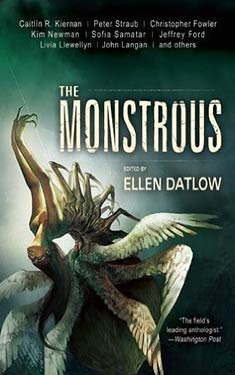 Had this book been titled Ellen Datlow’s Big Book of Monsters, there is little chance I would have picked it up. Not that I don’t love monsters. I am, in fact, a monster kid.
Had this book been titled Ellen Datlow’s Big Book of Monsters, there is little chance I would have picked it up. Not that I don’t love monsters. I am, in fact, a monster kid.
When I was five years old, previews for I Was a Teenage Frankenstein, The Blob, Attack of the Killer Shrews and their ilk flowed through the boxy, black-and-white television sets in dens and family rooms across the United States. Each of these creations looked potentially more marvelous that the one promoted the week before; and, once my parents made it clear that under no circumstances would I be allowed to attend these films, my fate was sealed. To this day, I will program the DVR to record almost any unfamiliar offering from the SyFy Channel or Chiller Network and watch it just long enough to see whatever ridiculous creature will be wreaking unconvincing CGI’d mayhem for the remainder of the two-hour time slot. Because really what I care about is that moment when the monster is revealed. I want to see the experiment gone wrong that’s kept chained in the cellar; the alien that emerges from the wrecked spacecraft; or, Godzilla’s latest sparring partner. After that first reveal, I have slowly learned over the decades to expect things to go downhill. But my enthusiasm for that first look has never waned.
My monster addiction is a visual thing. I have never cared much for monster stories. Verbal descriptions of the hideous tend to be anti-climactic and take too long. By the time I was twelve I quit expecting any of this stuff to be scary, but I want either an impressive crudeness or elegance to the creature, and I want to take it in at a glance. (And I will forestall some criticism here by saying that Clive Barker writes excellent monsters, China Mielville creates admirably alien aliens, and The Babadook recently scared the bejezzus out of me.)
By titling her new anthology The Monstrous, Ellen Datlow drew me in. She seemed to be promising “essence of the monster” rather than just the doings of the things themselves. And after editing what, something like 800 anthologies, I know that she knows her stuff. These are twenty-one stories that, while they will not duplicate the thrill of witnessing Ray Harryhausen’s Kraken lift its third arm out of the sea, can still satisfy the monster kid in all of us – and I know you are out there.
In her introduction, Datlow says she was looking for unusual monster stories, but she has not avoided such familiar creatures as vampires, serial killers, and ancient evils haunting tombs best left unopened. For the most part, her authors don’t depict creatures that depend on detailed description of their hideousness for effect. Adam-Troy Castro’s “The Totals,” features the widest array of nightmarish creatures, each tailor-made to terrify and inflict painful death on innocent victims. But his story is played for laughs. We meet them in an all-night diner where they gather to collect their weekly bonus pay. The comedy here stands out in three hundred pages of grimmer, sadder, bleaker stuff.
Datlow frontloads the anthology with literary firepower. Jeffrey Ford’s “A Natural History of Autumn” incorporates Japanese folklore into the high-stakes, globalized corporate world. Peter Straub offers a brilliant retelling of “Ashputtle,” the Grimm’s brothers version of the Cinderella story with the prince, the ball, and the happy ending replaced with a contemporary tale of life-long revenge carried out by an obese, homicidal kindergarten teacher. Caitlín Kiernan’s “The Beginning of the Year Without Summer” is a beautifully written, evocative tale, but – and I have had this experience before with Caitlín Kiernan – I am not quite sure what it’s about.
In any group of monster stories, curses will abound. In Gemma Files’ “A Wish from a Bone,” a group of archeologists who are also interested in careers on reality TV, open an ancient tomb to spectacularly dire results. One of the first of the crew to be possessed sprouts wings and spends the rest of the story flapping about overhead with her lungs dangling from her shattered chest cavity. Now that’s a cinematic image worthy of Eli Roth. The philosophical but ruthless vampire in Jack Dann’s and Gordner Dozios’ “Down Among the Dead Men” can be killed but his infection cannot. Stephen Graham Jones turns in a typically visceral tale set on a western-bound wagon train with a creature so foul that even his bleached bones pass on his monstrosity.
I have a couple of favorites: Sofia Samatar’s “How I Met the Ghoul” and John Langan’s “Corpsemouth.” In Samatar’s five-age vignette an understandably nervous reporter interviews an ancient, dangerous creature in an airport coffee shop. Both the reporter and the monster are in their way engaging characters.
Langan’s first person narrative takes a leisurely, novelistic approach and describes a family trip to visit the Scottish relatives of a young man’s recently deceased father. (Anyone who watches movies on the Chiller channel would know this is not a good idea.) The visit is a pleasant round of aunts, uncles, and cousins from several generations, all of whom offer dinners, single malt scotch, and sightseeing. One elderly great-uncle also tells the story of Corpsemouth, a creature from the days of King Arthur. It’s an ancient tale that will prove to have contemporary implications that tie the narrator to familial duties he has never imagined. This is a kind of curse, but on another level it is a monster kid’s dream come true.
(This review is based on an advanced ebook provided by Net Galley.)
3 Rs: The Goblin Emperor: Two Views
 Editor’s note: The Goblin Emperor has been receiving a lot of attention lately because of its inclusion on the Hugo ballot. It seems to be one of those books that polarizes readers—the elements that some love are the specific elements that others find annoying. In order to honor these divisions, this version of 3 Rs will show both sides through two reviews written especially for WWEnd.
Editor’s note: The Goblin Emperor has been receiving a lot of attention lately because of its inclusion on the Hugo ballot. It seems to be one of those books that polarizes readers—the elements that some love are the specific elements that others find annoying. In order to honor these divisions, this version of 3 Rs will show both sides through two reviews written especially for WWEnd.
Noclichehere’s review is generally positive while illegible _scribble’s is more lukewarm. This blog begins with illegible_scribble’s review in full and offers a closing counterpoint from Noclichehere.
 illegible_scribble
illegible_scribble
4/18/2015
An enjoyable book, but…
I hadn’t gotten around to reading this yet, partly because, based on the synopsis, I wasn’t sure it would be my cup of tea. But I’ve seen so many people rave about this book on Facebook and blogs, and it managed to make it onto the Hugo ballot as a legitimate entry. So I moved it up on my to-be-read list.
This story is a mix of steampunk, murder-mystery, character-study, and royal-court-political-intrigue. It features a half-breed prince who has been scorned and locked away since childhood, but who suddenly ascends to the throne when his emperor father and three favored half-brother princes all die mysteriously in an airship accident.
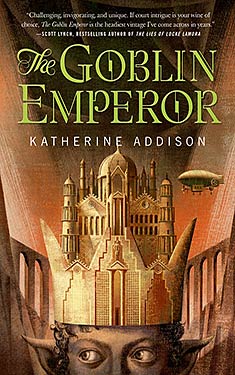 I found the story interesting – even engrossing. But I fall short of raving about it. Although he’s appealing, the main character feels to me rather one-dimensional. He’s a good person who consistently behaves with honor and forbearance, who wins unlikely friends out of many of his enemies and, despite having had a pretty horrible life, almost never has bad urges – and gives into those urges even less often.
I found the story interesting – even engrossing. But I fall short of raving about it. Although he’s appealing, the main character feels to me rather one-dimensional. He’s a good person who consistently behaves with honor and forbearance, who wins unlikely friends out of many of his enemies and, despite having had a pretty horrible life, almost never has bad urges – and gives into those urges even less often.
Part of the reason for my sense of lack of dimension may be due to the fact that the story starts as the prince ascends to the throne. We are told a little bit, here and there, about the bullying and abuse previously suffered by him prior to this – but we don’t experience it along with him. We aren’t given much background about how his character evolved.
With regard to the worldbuilding, I’m mystified as to the reason for having the two main races be goblins and elves. It bears no relevance to the story. These aren’t goblins and elves from fairy stories. They could just have easily been linbogs and veles, or sariths and calires. It seems like rather lazy worldbuilding to me, to have used goblins and elves.
The mystery is interesting, but the solution is not that unpredictable or mysterious. The court intrigue is engaging, but not that gripping or revelatory. When I got done reading, I felt as though I had eaten a meal, which was quite tasty at the time, but afterward left me feeling still a bit hungry and unsatisfied.
I’m glad I read it, and I enjoyed it – but I would probably not have put it on my Hugo nominee list.
Other readers’ mileage may – and obviously does – vary. I’ve seen review reactions ranging from “OMG, this is fantastic!” all the way to “I couldn’t finish this, it was just too tedious.” I’ve also seen comments from a couple of people who say that, having been bullied and abused as children, they found especially heartening the main character’s basic decency, and the fact that he survives such a background and comes into his own as a wise, beneficent ruler despite it.
I do sincerely recommend giving this novel a try – but not feeling bad, if it turns out to not be your “thing”.
As an aside, I’ve seen several people express difficulty remembering and understanding all the people and place names. There is a Name Glossary at the back of the book (at least in the printed version), which many people will likely find helpful.
Counterpoint from Noclichehere:
 The Goblin Emperor is a wondrously-told, rags-to-riches story set in a vividly interesting, steampunk-ish, fantasy world. The mystery aspect to the story is very subtle to start, taking a back seat to all the other goings-on, and indeed much isn’t revealed to the reader until they’ve read more than halfway through the novel. But even with that fact aside, the pace of the story is by no means boring.
The Goblin Emperor is a wondrously-told, rags-to-riches story set in a vividly interesting, steampunk-ish, fantasy world. The mystery aspect to the story is very subtle to start, taking a back seat to all the other goings-on, and indeed much isn’t revealed to the reader until they’ve read more than halfway through the novel. But even with that fact aside, the pace of the story is by no means boring.
There are countless other things that demand the emperor’s attention while the investigation is being conducted, and the reader will not at all be bored in the meantime as they watch Maia grow and learn about the subtle social conventions of nobility; understand the relationships between feuding families; explore the baffling expanse of the city-sized palace; and much more. Maia is a genuinely kindhearted young man among a sea of cut-throat, two-faced officials looking to gain his favor for their own selfish reasons. His sudden promotion to emperor did nothing to smite his humble nature from living modestly all his life. Because of this he is unusually gracious and kind for an emperor who more often times offends and confounds his courtiers than it does make them like him […].
Overall, I really loved this novel and I would recommend it to anyone who’s infatuated with the idea of courts and kingdoms; lords and ladies; nobility and royalty; elves and goblins; magic and fantasy; and last, but surely not least, mystery and romance.



















 Full Details
Full Details


